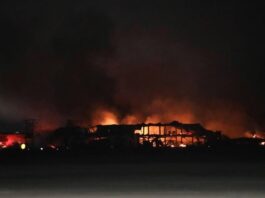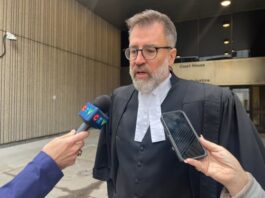
Months into its operations, a municipal task force responsible for tracking down illegal short-term rentals in Montreal says it still lacks the tools necessary to verify whether people are being honest when applying to rent out their space — something it says the Quebec government is able but unwilling to do.
City officials met with reporters on Wednesday, nearly a year to the day after a fire in Old Montreal killed seven people and sparked conversations about the safety of short-term rental units and the need to root out illegal operators.
In the fire’s aftermath, Quebec, the city of Montreal and some of its boroughs vowed to crack down on illegal short-term rentals.
Since August, the city’s team has carried out 394 inspections and issued 42 tickets for fines ranging from $1,000 to $4,000 — 19 of which have been served to offenders, its co-ordinator Marie-Claude Parent told reporters.
The inspections took place in three boroughs that make up the bulk of the city’s Airbnb listings: Ville-Marie, the Plateau-Mont-Royal, and the Sud-Ouest.
In the Plateau, inspectors were able to shut down one illegal Airbnb and the accommodation was put back on the housing market.
“We were able to give housing back to the population,” said Parent.
While that’s the overall goal of the squad’s operations, the city says it doesn’t have the means to crack down on bad actors who falsely claim to be operating out of their primary residence in order to circumvent municipal bylaws.
Dorais said this blindspot in enforcement can only be filled by the Quebec government and its inspectors.
“It is Quebec that has the powers, skills and technological tools to determine the principal residence of an individual,” Dorais said.
“This is why we are looking for better collaboration with the government of Quebec.”
Radio silence from Revenu Québec, city says
Each Montreal borough has clear rules outlining where commercial short-term rentals are allowed, if any, although most allow people to rent out their main home with a registration number from the Corporation de l’industrie tourisme du Québec (CITQ).
In order to get that number, you need a notice of compliance from your borough.
Dorais says a person can simply claim that a rental accommodation is their main residence in order to get that notice from the municipality, which cannot ensure the accuracy of the information. Even someone’s listed address doesn’t prove it’s their primary residence.
For each accommodation suspected of being illegal, city inspectors need to put together a comprehensive file, complete with photos of the home to prove it is not the main residence of the person renting it out.
“This can take up to 60 to 80 pages of evidence,” said Parent.
Inspectors share all those files with Revenu Québec, which has the power to issue fines ranging from $2,500 to $25,000 for an individual and from $5,000 to $50,000 for a company illegally operating tourist residences.
But city officials say they have no way of knowing whether harsher fines are handed down.
“We send all the files to Revenu Québec … but we don’t have any results,” said Parent. “We don’t know what has gotten further inspection.”
For its part, Revenu Québec said it is in “constant discussion” with Montreal’s task force.
“Revenu Québec is proactive in its strategies to ensure that everyone pays their fair share,” a Wednesday statement reads.
The agency has doubled its number of tourist-accommodation inspectors since the province’s tougher rules came into effect in September.
Shared responsibility, says Tourism Ministry
Quebec’s Tourism Ministry said it’s a shared responsibility to verify that a person who declares a property as their principal residence is telling the truth.
“The municipality must, for its part, carry out reasonable checks before issuing its notice of conformity in order to ensure … that it complies with its regulations,” a statement reads.
“The CITQ carries out checks before issuing a registration number to determine whether it is indeed a principal residence and also requires supporting documentation.”
The City of Montreal and housing advocates say Quebec isn’t enforcing its short-term rental rules strongly enough. One brand new building in Montreal has become a flashpoint for the issue, targeted with anti-Airbnb graffiti.
According to the provisions of the Tourist Accommodation Act, a false declaration in a prescribed document is punishable by fines up to $50,000.
A report available on the Revenu Québec website shows inspectors have served 428 infraction notices in Montreal under the Tourist Accommodation Act, 279 of which resulted in fines totalling nearly $1.2 million between April 1 and Dec. 31, 2023.
The report does not provide a breakdown of the fines.
In a statement, Airbnb says it’s following the rules put in place by the Quebec government, but “no other municipality or province has a system as cumbersome.”
Different priorities
David Wachsmuth, a researcher and professor at the School of Urban Planning at McGill University, says in Quebec, the problem is that there are three levels of government, each with a partial responsibility to enforce the rules and each with different priorities when it comes to regulating short-term rentals.
“The province has been pretty clear through their actions that they see the big question here as making sure that hosts follow the rules around registering for permits,” Wachsmuth said.
“Whereas in Montreal, it’s very clear that the big issue here is, ‘We don’t want full-time housing being converted to hotels, effectively,’ and the problem is that priority isn’t shared by the province.”
Wachsmuth says it’s a missed opportunity that there’s not better co-ordination between policy-makers.
“Why bother having this whole provincial registration system if they’re not going to use that information to, you know, help enforce local rules?” he said.
While there are lots of people still getting around the rules, Wachsmuth says, Quebec “is headed in the right direction” with its tougher laws.
“The current approach is working, its just not working as well or as quickly as we’d like.”
This article is from from cbc.ca (CBC NEWS CANADA)













